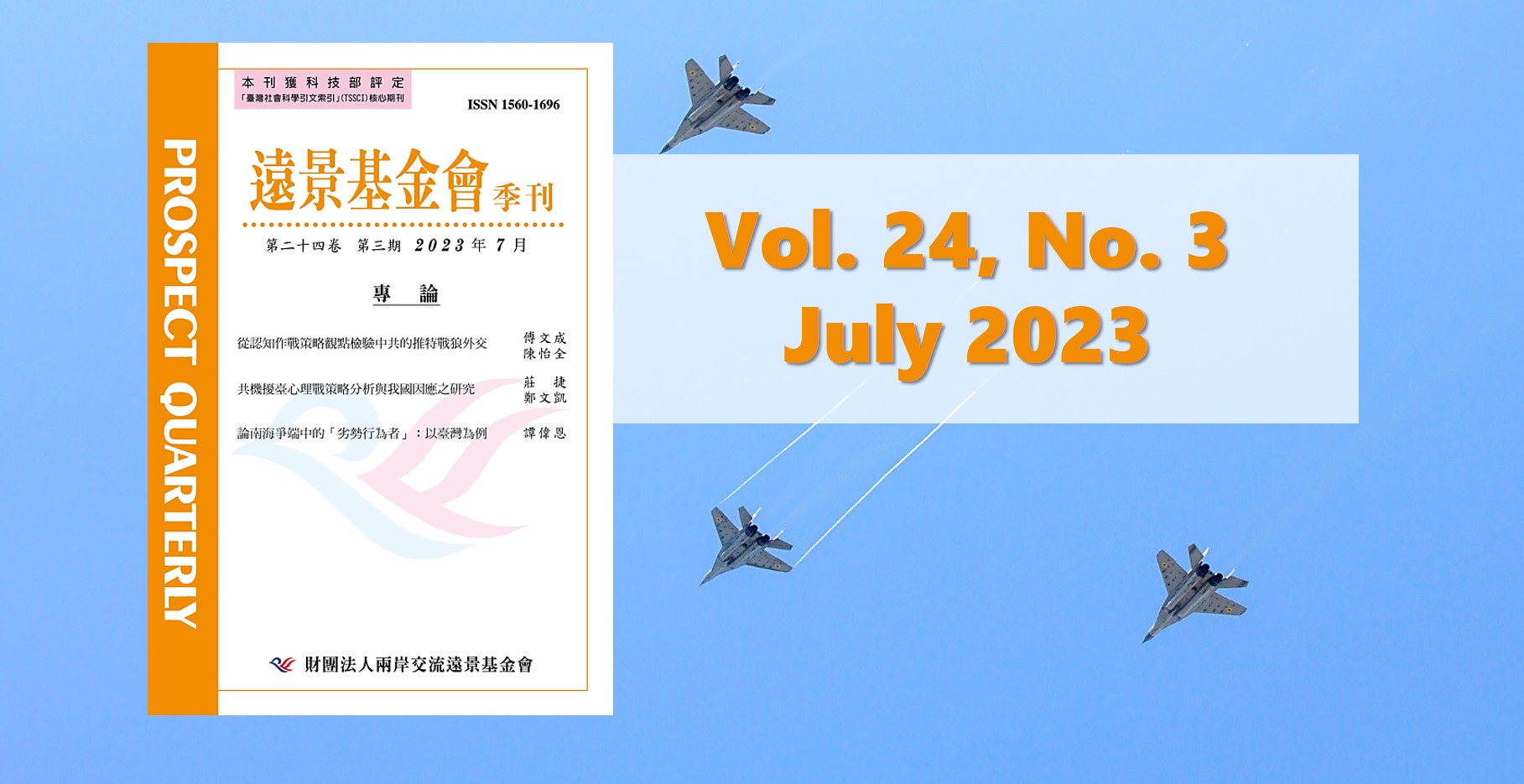Prospect Quarterly 24-3
Cognitive Warfare Strategies and the Impact of PRC “Wolf Warrior” Posts on Twitter
Wen-cheng Fu
(Professor and Department Head,
Department of Journalism, National Defense University)
Yi-chuan Chen
(Ph.D. Student, Department of Politics, National Defense University)
Abstract
Since the second half of 2019, in response to the United States’ “America First” policy, China has shifted from its previous moderate and observant foreign policy to an assertive and outwardly expanding style with increased strength in economy, military and other fields. Western media have coined the term “wolf warrior diplomacy” to describe radical and aggressive statements during the COVID-19 pandemic by some Chinese diplomats. China is using “wolf warrior diplomacy” to try to gain international discourse power and wage cognitive warfare on the international stage. This study uses data science and artificial intelligence to collect the Twitter posts of Chinese Foreign Ministry spokesperson Hua Chunying and Zhao Lijian from 2020 to 2021, and analyzes their content and emotional manipulation strategies through artificial intelligence methods such as topic modeling, BERT, and social network analysis. It presents the strategies and patterns of China’s “wolf warrior diplomacy” and cognitive warfare. The research results show that “wolf warrior diplomacy” is an important means of influencing international perceptions. “Issues related to the United States, human rights, and the pandemic” are all major themes of wolf warrior diplomacy. At the same time, this research also finds that “wolf warrior diplomacy” has a clear division of labor in the overall Chinese foreign policy system, interwoven with the network of cognitive warfare from the central government, foreign missions, participants and foreign diplomats in other countries.
Keywords: Cognitive Warfare, Wolf Warrior Diplomacy, Social Media, Emotional Contagion, Grand External Propaganda Work
An Analysis of China’s Psychological Warfare Through PLA Aircraft Incursions Into Taiwan’s ADIZ
Chieh Chuang
(Ph. D. Candidate, Department of Political Science,
National Defense University)
Wen-kai Zheng
(Ph. D. Candidate, Department of Political Science,
National Defense University)
Abstract
Over the past year, increasing Chinese military aircraft activity in the Taiwan Strait has undermined Cross-Strait relations, posing a threat to the peaceful and stable status quo. This paper analyzes the diversity of flight routes, types of formation, and frequency of aggressiveness of PLA sorties. It first discusses the use of incursions into the ADIZ as part of China’s psychological warfare campaign, then looks at the targets of this campaign before suggesting some counteracting measures to policy makers.
Keywords: Psychological Warfare, PLA Incursions, Long-Range Flight Training Over Water, Median Line, ADIZ
On the “Disadvantaged Actor” in the South China Sea Disputes: A Study of Taiwan
Wei-en Tan
(Professor, Graduate Institute of International Politics,
National Chung Hsing University)
Abstract
The existing literature ignores the fact that in the South China Sea territorial disputes, even legally recognized governments or countries that have access to international judicial institutions have not successfully resolved their longstanding issues both among themselves and with the Chinese government. This paper proposes a new approach — the disadvantaged actor — to demonstrate that compared to the parties mentioned above, Taiwan, despite its disadvantaged position, has a much more flexible stance than the Beijing authorities (the government that effectively rules the mainland of the Republic of China) in how to claim its rights in the South China Sea. As such, Taiwan has more space for cooperation with the Philippines and Vietnam in a reciprocal way without causing instability. Furthermore, the effective governance and actual control of the Pratas Islands and Itu Aba make it impossible to ignore Taiwan, which in turn can use this to its advantage.
Keywords: Taiwan, Pratas Island, Itu Aba Island, South China Sea Disputes, Disadvantaged Actor




